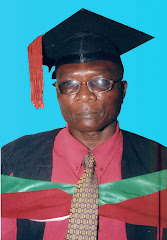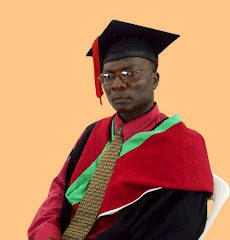Sunday, December 4, 2016
UN Chief appoints Nigerian national to stand for MICT courts in Arusha
UNITED Nations Secretary- General, Ban Ki-moon has appointed Mr Olufemi Elias of Nigeria as the Registrar of the Mechanism for International Criminal Tribunals (MICTs) which was recently inaugurated in Arusha. Mr Olufemi, who once worked as an anti-chemical weapon director, will effectively resume his position at ICT or “Mechanism”, effective from January 2017. The Nigerian takes over from Mr John Hocking of Australia, who has been serving as the Registrar of the MICT since January 2012. The Secretary-General expressed his gratitude to Mr Hocking for his service, including his instrumental role in setting up the Mechanism, and overseeing the construction of its new premises in Arusha. Mr Elias has been serving as the Executive Secretary of the World Bank Administrative Tribunal since July 2016, a position which he also held from 2008 to 2013. He has also previously served as a Legal Adviser and Director at the Organization for the Prohibition of Chemical Weapons (OPCW) from 2013 to 2016, and as a Senior Legal Officer at the OPCW from 2005 to 2008. Between 1998 and 2005, he worked in legal positions at the United Nations Compensation Commission. Judge Theodor Meron, President of the Mechanism, welcomed the appointment of Mr Elias, stating: “I look forward to working closely with Mr Elias to ensure that the Mechanism will continue to serve as a model of best practices and to be lean, efficient, and effective as it carries out the essential functions entrusted to it.” President Meron also praised Mr Hocking, who will continue to serve as the Registrar of the International Criminal Tribunal for the former Yugoslavia, for his contributions to the Mechanism over the course of nearly five years. “Registrar Hocking has played an invaluable role in helping the Mechanism take shape, overseeing the smooth transition of key functions from the International Criminal Tribunals for Rwanda and the former Yugoslavia, and seeing the construction of the Mechanism’s new premises in Arusha through to completion, a legacy of which Mr Hocking can and should be proud,” he said. The official opening of the new premises of the Arusha branch of the Mechanism for International Criminal Tribunals (MICT) or ‘Mechanism’ took place at Laki Laki area late last week and was presided over by Vice- President Ms Samia Suluhu Hassan. More than 300 delegates attended the function, including Tanzanian government officials, representatives of the international community and the United Nations, judges and staff of the MICT, and the media. The unveiling of the plaque at the new premises marked the official opening of the new home of the Mechanism in Arusha at the Lakilaki area. During his remarks commencing the opening ceremony, Judge Theodor Meron, President of the MICT, acknowledged the indispensable role the government of Tanzania played in making the new MICT premises a reality. President Meron also underscored the role of the MICT in Africa, noting that: “With the Mechanism rooted firmly here, in mandate, culture, and context, it is not too much to say that this is an African court, and that in carrying out the vital mandate that it has been given, the Mechanism will serve, first and foremost, the people of this region and the world.” Mr Miguel de Serpa Soares, the United Nations Under-Secretary-General for Legal Affairs and United Nations Legal Counsel, delivered a message on behalf of the United Nations Secretary- General, Ban Ki-Moon. Mr Moon was of view that all victims share the same desire “to see those responsible for the crimes against them brought to justice”, adding “the opening of the new MICT facility in Arusha, the African city of justice, is an important opportunity to promote and support accountability for international crimes more broadly”. The three buildings of the new premises – the courtroom, the archives and the office building – have been designed to serve the specialized functions of the Mechanism, which include the completion of remaining judicial work, archives management, witness protection, supervision of enforcement of sentences, and assistance to national justice.
Chinese expert advises Africa to rely on agriculture
AFRICAN countries need to focus their attention on
the use of more land by engaging in agriculture to create more jobs to overcome
problems of food insecurities. Deputy Director at the International Poverty
Reduction Center in China, Dr Tan Weiping, made the remarks on Thursday this
week at the African Civil Society Organization Workshop which is coordinated by
the China NGO Network for International Exchanges (CNIE) in Beijing. Dr Weiping
said problem of unemployment in Africa can be tackled through modernisation of
agriculture and industrialisation in building sustainable development in the
countries. ‘Poverty eradication, green development and innovation are therefore
essential to the achievement of a strong, inclusive and balanced growth of the
world economy and that of the agenda 2030 for Sustainable Development, said Dr
Weiping. In order to end poverty, there is a need for new skills development as
well as overcoming the use of outdated equipment in farming. For that matter,
China has changed its poverty reduction programs to poverty elimination
programs which assist the country to reduce the number from 70 million people
last year to 55. 7 million people in 2015. From the year 1978 to 2009 China’s
economic growth rate had maintained 10 percent, whereas the current goal is to
lift out of poverty the remaining population by the year 2020. China’s plan of
poverty elimination is being undertaken through the 13th Year Five-Year
Development Plan which is going to end in 2020. Government’s are thus urged to
create favourable policy environment to support and encourage the private
sector and civil society to play a greater role in poverty alleviation. The
Secretary General of Chinese Follow-up Committee for the Forum on China-Africa
Cooperation, Amb Lin Songtian, who is also the Director of Africa Affairs in
the Ministry of Foreign Affairs noted several concepts to assist Africa to
attain development. He pointed out that China was committed to support programs
that would improve the livelihood of the people through incentive, industrial
and green development.
TASAF advised to focus on women empowerment
TANZANIA Social Action Fund (TASAF) has been urged
to work more to empower women in aspects of access and decision on credits to
fulfill their desire to redeem Tanzanians from poverty. This is according to the
baseline results from the research on the impact of cash transfers on women’s
empowerment and on Youth wellbeing along with their transition to adulthood in
Tanzania conducted by a research institution REPOA in collaboration with United
Nations Children’s Fund (UNICEF). According to the report, giving cash
transfers might result in more control on the income, but empowering women to
have ability to make decisions on resources is even more important because it
is linked with graduation out of poverty. REPOA Senior Researcher, Dr Flora
Myamba, said TASAF may need to work more to empower women in aspects of
resources that are ownership, sale, purchase and transfer of assets, as helping
women was good for both men and women in families and communities. “The study
is important because economic growth and poverty alleviation are linked with
gender relations and women’s empowerment, their inclusion and empowerment is
not only a human right but a more efficient way to promote growth and poverty
alleviation,” she remarked Dr Myamba said the study was carried out before
phase three funds were disbursed, “We will carry out another study 18 months
later after they get the funds from TASAF, asking the same questions to find
out if there are any improvements,” Expounding further, she said the overall
goal of the study was to explore the extent to which the Productive Social
Safety Net (PSSN) implemented through TASAF enhance women autonomy and power to
make decisions in production, resources, income, leadership and time use. She
said the study was conducted in May-July 2015 in eight districts in the
mainland and one from the Island was included in youth survey. Among other key
findings of baseline surveys, she said, found that targeted population was
really poor, which means TASAF targeting of extreme poor was successful for 90
per cent, where they also explored the role of culture, religion and legal
aspects in facilitating and or obstructing women’s empowerment. The sample size
for the study was 1,335 households with 11,000 people and on youth from same
households, 800 were picked, in which 1,300 youth were interviewed. The
districts involved were Uyui, Kisarawe, Handeni, Itilima, Mbogwe, Kahama,
Misungwi, Kilosa and Unguja. On youth survey, she said the study covered age’s
ranging from 14 to 28 years, in which they found that there were low reported
rates of having basic material needs met. Only 1 in 4 have all their basic
material needs met. “There were high level of violence reported, which includes
acceptability of domestic violence, emotional, physical and sexual, where 70
percent of females agreed that husbands were justified in beating their wives,”
Dr Myamba said Director for Non- Governmental Organization (NGOs) from the
Ministry of Health, Community Development, Gender, Elderly and Children, Mr
Marcell Katemba, said knowledge on those areas was of great interest to policy
makers as women in Tanzania tend to be left out in the mainstream economic
activities
Tanzania reiterates its desire to add more Bombardiers’ aircrafts
THE government has reiterated its desire that as from next month it will receive one more Bombardier Q400 plane and that a further two Bombardier SC300 aircraft will arrive in 2018. Minister of Works, Transport and Communication, Prof Makame Mbarawa, said this on Thursday this week noting that the government’s procedures to purchase those jetliners was in progress. The purchase of the CS300 airliners, which are the most economical aircraft on the market in their class, will make a total of five new planes the government would have purchased in a period of two years. Only days ago, the first such CS300 was delivered to global launch customer AirBaltic after Swiss, part of the Lufthansa Group. Treasury Registrar (TR), Mr Lawrence Mafuru, recently said the government has so far made a 30 per cent advance payment for three more airplanes, including a Bombardier SC300 jetliner, and another $10 million advance payment for a 200-seater Boeing plane. The money for the airplanes went to Canada.
Last September, the government received two Bombardier Q400 planes which have already started operations in the Tanzanian skies as commercial flights. It is expected that the delivery of two Bombardiers SC300 planes in 2018 will then facilitate the resumption of flights to more domestic and regional destinations. This comes at a time when local rivals Precision Air and Fastjet in Tanzania remain in loss making territory and coincides with Fastjet suspending their flights from Dar es Salaam to Entebbe and Nairobi, giving Air Tanzania unexpected openings to take on such vacated routes with smaller and more efficient aircraft. The sale of the first ever CS series aircraft to Africa by Bombardier is a coup of sorts over other manufacturers, in particular Embraer and will probably help to open the African market for such jets in the 100 – 150 seat market. Air Tanzania Company Limited (ATCL) received the Q400 aircraft from Canadian manufacturer Bombardier following the purchase agreement signed in August 2016. The aircraft were delivered with a 76-seat configuration at the price of USD 62m. The purchase is part of ATCL’s plan to expand in Tanzania.
TRA advocates secondary schools on matters of tax compliances
THE
Tanzania Revenue Authority (TRA) on Thursday this week launched the Secondary
Schools Tax Clubs Competition for Dar es Salaam and Coast regions that aims at
preparing students on matters of tax compliance. TRA Director of Education and
Taxpayer Services, Mr Richard Kayombo launched the competition at Shaaban
Robert Secondary School in Dar es Salaam, expressing optimism that the
competition did not only aim at strengthening interschool cooperation but
create awareness on the importance of tax for the country’s economy. About 47
secondary schools from Dar es Salaam and Coast regions participated in the
competition that shall see the top three winners walking out with flat screen
television sets, computers and printers. “We understand that the students have
an outstanding contribution to their families in educating and advising on
matters concerning tax, so this competition is a crucial impetus towards the
importance of paying tax for the country’s development,’’ he said. According to
Mr Kayombo, another competition was conducted in Kilimanjaro Region and it had
a lot of success on matters of tax. He added that the tax watchdog had already
established other clubs in the higher learning institutions in its bid to have
all forms of taxes known to Tanzanians. “We know that these students will be
business people and employees in future, so it is equally important for them to
have a broader knowledge in matters of tax. The TRA official further insisted
that TRA would continue helping the clubs in the various secondary schools to
its capacity. “The students go to shop, so by inculcating knowledge into them,
we believe that they will be demanding receipts upon purchasing their various
products and they will equally remind their parents on the same,’’ said Mr
Kayombo
Subscribe to:
Posts (Atom)










